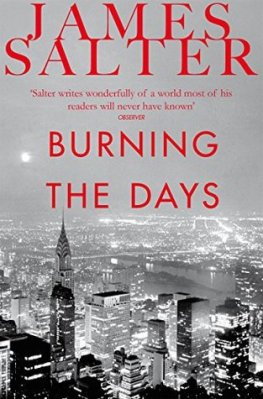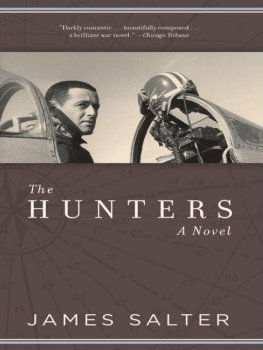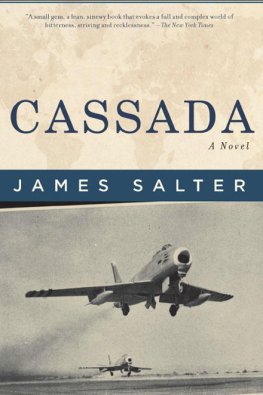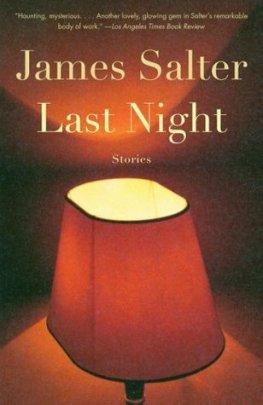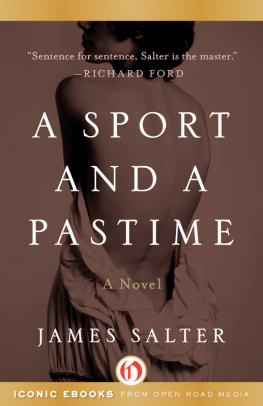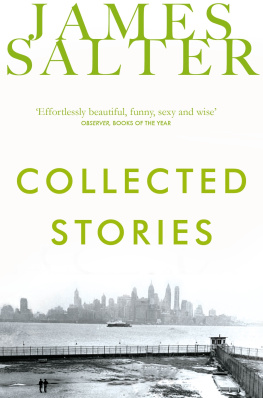James Salter
Burning the Days
With deepest gratitude
to my wife, Kay, and Bill Benton
for their invaluable help
Certain names in this book have been changed to avoid possible embarrassment to individuals living or dead. The altered names are: (Chapter One) Faith; (Chapter Three) Anita; (Chapter Four) Miss Cole, Demont, Neal, Paula, Leland, OMara; (Chapter Five) Brax, Miles; (Chapter Six) Garland; (Chapter Nine) Ilena, Miss Bode, Edoardo; (Chapter Ten) the widow Woods, Sis Chandler.
This book is, to some extent, the story of a life. Not the complete story which, as in almost any case, is beyond telling the length would be too great, longer than Proust, not to speak of the repetition.
What I have done is to write about people and events that were important to me, and to be truthful though relying, in one place or another, on mere memory. Your language is your country, Lautaud said, but memory is also, as well as being a measure, in its imprint, of the value of things. I suppose it could be just as convincingly argued that the opposite is true, that what one chooses to forget is equally revealing, but put that aside. Somehow I hear the words of E. E. Cummings in The Enormous Room: Oh, yes, Jean, he wrote, I do not forget, I remember Plenty
Apart from my own memory I have relied on the memories of others, as well as on letters, journals, and whatever else I could find.
If you can think of life, for a moment, as a large house with a nursery, living and dining rooms, bedrooms, study, and so forth, all unfamiliar and bright, the chapters which follow are, in a way, like looking through the windows of this house. Certain occupants will be glimpsed only briefly. Visitors come and go. At some windows you may wish to stay longer, but alas. As with any house, all within cannot be seen.
I was led to write this book by my editor, Joe Fox, who had read a kind of personal essay not conceived of as a chapter called The Captains Wife in Esquire in 1986, and urged me to write more. After some hesitation, I began.
I found it difficult, more perhaps than will be apparent, to write about myself. I had, as will be shown in the second chapter, come to believe that self was not the principal thing, and I lived that way for a long time. Also, to revisit the past was like constantly crossing a Bergschrund, a deep chasm between what my life had been before I changed it completely and what it was afterwards.
As a result, the writing was slow. Wearied by self-revelation, I would stop for months before starting in again. The sad part is that near the last, Fox, who had stood by loyally the entire time, died before seeing the concluding pages. It is to him that the book owes its existence.
In the past I have written about gods and have sometimes done that here. It seems to be an inclination. I do not worship gods but I like to know they are there. Frailty, human though it may be, interests me less. So I have written only about certain things, the essential, in my view, the world as it was, at least for me.
In youth it feels ones concerns are everyones. Later on it is clear that they are not. Finally they again become the same. We are all poor in the end. The lines have been spoken. The stage is empty and bare.
Before that, however, is the performance.
The curtain rises.
J. S.
THE TRUE CHRONICLER of my life, a tall, soft-looking man with watery eyes, came up to me at the gathering and said, as if he had been waiting a long time to tell me, that he knew everything. I had never seen him before.
I was in my fifties. He was not much older but somehow seemed an ancient figure. He remembered me when I was an infant riding in a horse-drawn carriage on Hope Avenue in Passaic. He named my birthday, June tenth, 1925, am I right? Your picture was in The New York Times when you were a captain in Korea and had just shot down three planes. You married a girl from Washington, D.C. You have four children.
He went on and on. He knew intimate details, some a bit mixed up, like a man whose pockets are filled with scraps of paper. His name was Quinton; he worked in a post office and was called, I learned later, the Historian, derisively, as if his passion were useless and even embarrassing. As if it were an attempt to try to be of some importance. You went to Horace Mann, he said. The football coach was Tillinghast.
In fact, the football coach was a bandy-legged, graying man named Tewhill. Tillinghast was headmaster. I felt it was a minor error.
There is your life as you know it and also as others know it, perhaps incorrectly, but to which some importance must be attached. It is difficult to realize that you are observed from a number of points and the sum of them has validity.
His wife was begging him to leave me alone. I was astonished at what he knew. Forty-four State Street. That was your grandmothers house, right? She served you lentil soup and steak when your father brought you to visit he hired a cab once a month.
The run-down frame house on the corner with cement steps going into the yard, and the unvarying meal of which I was fond, on a square table in the kitchen, followed by the hour afterwards when, with nothing to do, I sat on the back steps while my father talked to his mother, telling her of things he was doing and comforting her, I suppose. The driver sat silently waiting in the cab.
My father and I made these journeys together. My mother never came. Up the West Side of Manhattan along the river, vacant Sunday morning, looking out the window, the endless drab apartment buildings on one side and in the distance, gleaming, the new George Washington Bridge. Cigar smoke, fragrant and sickening, fled past the top of the glass near my father as he sat musing, sometimes humming softly to himself. Over the drivers radio came the impassioned words of the fervent anti-Semitic priest who broadcast every Sunday, Father Coughlin. His repeated fierce phrases beat against me. These were lean times. The driver was earning five dollars for the trip, including waiting for two hours before taking us back. It was a different driver always, the cab hailed on the street and quickly hired.
We passed beneath the great fretted tower at the east end of the bridge, always significant to me since the time my father said a restaurant had been planned for the very top of it. There was an elevator within the steel framework and we had once gone up in it, perhaps in my imagination, even the Olympian view.
The Hudson was the river of my youth, the river of sunset and wedding cake dayliners, my own river though I never so much as felt a drop of its water on my hand or brow. I had walked across the bridge more than once, leaning over the railing to look down at the dark water an infinite distance below, sometimes lucky enough to see a white excursion boat plow past, its sunny upper deck filled with chairs like an auditorium with the roof gone. Once a year in a long line towards the sea the fleet lay at anchor, cruisers named for distant cities and broad battleships later sunk at Pearl Harbor. From somewhere along the shore, launches took you out to visit them. I had gone several times, climbed the steel ladders and stood beneath the tremendous guns. The crew in their white, wide-bottomed trousers, the manly officers, the wooden decks it was something of which to be proud, the sole defense of the innocent and unarmed republic in which I was born.
On the far side, above the green bulk of the Palisades, was another landmark, a nightclub called the Riviera a gambling club I had heard, Le Corbusier like and modern that at one time burned to the ground and was rebuilt. It was related through its owner to an order of earlier, legendary places, the Silver Slipper, Cotton Club, and others.

